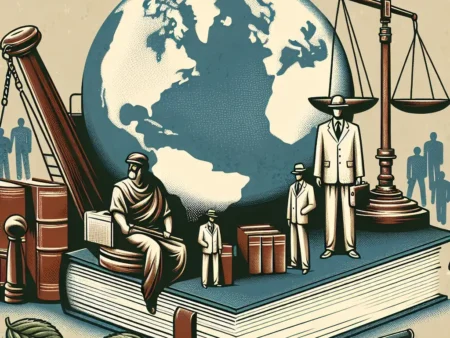Lembaga Hukum berperan penting dalam menangani kasus TKI untuk melindungi hak-hak mereka dan memberikan keadilan.
Peran Lembaga Hukum dalam Menangani Kasus TKI
-
Table of Contents
- Introduction
- The Plight of Indonesian Migrant Workers
- 1.1 The Scale of the Issue
- 1.2 Challenges Faced by TKIs
- The Role of Legal Institutions
- 2.1 The Indonesian Government’s Efforts
- 2.2 The Role of the National Agency for Placement and Protection of Indonesian Workers (BNP2TKI)
- 2.3 The Role of Indonesian Embassies and Consulates
- Legal Measures and Initiatives
- 3.1 Ratification of International Conventions
- 3.2 Strengthening Domestic Legislation
- 3.3 Collaboration with Destination Countries
- Challenges and Future Outlook
- 4.1 Enforcement and Monitoring
- 4.2 Empowering Workers and Raising Awareness
- 4.3 Strengthening International Cooperation
- Summary
Introduction

The issue of Indonesian migrant workers, known as Tenaga Kerja Indonesia (TKI), has been a longstanding concern for the country. Many Indonesians seek employment opportunities abroad to escape poverty and provide for their families. However, the journey of these migrant workers is often fraught with challenges and risks, including exploitation, abuse, and even death. In this article, we will explore the role of legal institutions in addressing the issues faced by TKIs and the measures taken to protect their rights.
The Plight of Indonesian Migrant Workers
1.1 The Scale of the Issue
Indonesia is one of the largest labor-exporting countries in the world, with millions of its citizens working overseas. According to data from the International Organization for Migration (IOM), there were approximately 4.5 million Indonesian migrant workers in 2019. These workers are primarily employed in countries such as Malaysia, Saudi Arabia, and Singapore.
1.2 Challenges Faced by TKIs
Despite the economic benefits of working abroad, Indonesian migrant workers often face numerous challenges. Many are subjected to exploitative working conditions, low wages, and long working hours. Some are even victims of physical and sexual abuse. Additionally, the lack of legal protection and awareness about their rights further exacerbates their vulnerability.
The Role of Legal Institutions
2.1 The Indonesian Government’s Efforts
The Indonesian government has recognized the need to protect its migrant workers and has taken several measures to address the issues faced by TKIs. The Ministry of Manpower and Transmigration, in collaboration with other relevant institutions, has implemented various policies and regulations to safeguard the rights and welfare of Indonesian migrant workers.
2.2 The Role of the National Agency for Placement and Protection of Indonesian Workers (BNP2TKI)
The National Agency for Placement and Protection of Indonesian Workers (BNP2TKI) plays a crucial role in overseeing the recruitment and placement process of Indonesian migrant workers. BNP2TKI ensures that recruitment agencies comply with the established regulations and monitors the welfare of TKIs abroad. It also provides legal assistance and support to workers who encounter problems during their employment.
2.3 The Role of Indonesian Embassies and Consulates
Indonesian embassies and consulates in destination countries also play a vital role in protecting the rights of TKIs. They provide consular services, including legal assistance, mediation, and repatriation support. These diplomatic missions act as a bridge between the workers and the host country’s legal system, ensuring that their grievances are addressed and justice is served.
Legal Measures and Initiatives
3.1 Ratification of International Conventions
Indonesia has ratified several international conventions and treaties that aim to protect the rights of migrant workers. Notably, Indonesia is a party to the International Convention on the Protection of the Rights of All Migrant Workers and Members of Their Families. This commitment reflects the government’s dedication to upholding the rights and welfare of its citizens working abroad.
3.2 Strengthening Domestic Legislation
To further protect the rights of TKIs, the Indonesian government has enacted various laws and regulations. The Law on the Placement and Protection of Indonesian Workers Overseas (Law No. 18/2017) sets out the legal framework for the recruitment, placement, and protection of Indonesian migrant workers. It establishes the responsibilities of recruitment agencies, employers, and the government in ensuring the welfare of TKIs.
3.3 Collaboration with Destination Countries
The Indonesian government actively engages in bilateral and multilateral cooperation with destination countries to enhance the protection of its migrant workers. Memoranda of Understanding (MOUs) and bilateral agreements are signed to establish mechanisms for cooperation, information exchange, and dispute resolution. These collaborations aim to improve the working conditions and rights of TKIs.
Challenges and Future Outlook
4.1 Enforcement and Monitoring
While significant efforts have been made to protect the rights of TKIs, enforcement and monitoring remain significant challenges. The vast number of Indonesian migrant workers and the complexity of their employment arrangements make it difficult to ensure compliance with regulations. Strengthening enforcement mechanisms and enhancing monitoring systems are crucial to address these challenges effectively.
4.2 Empowering Workers and Raising Awareness
Empowering TKIs with knowledge about their rights and providing them with access to legal assistance are essential steps in protecting their welfare. The government, in collaboration with civil society organizations, should conduct awareness campaigns and provide training programs to educate workers about their rights, employment contracts, and available support services.
4.3 Strengthening International Cooperation
Given the transnational nature of the issue, international cooperation is vital in addressing the challenges faced by TKIs. Indonesia should continue to engage with destination countries, international organizations, and civil society groups to share best practices, exchange information, and advocate for the rights of migrant workers globally.
Summary
In conclusion, the role of legal institutions in addressing the issues faced by Indonesian migrant workers is crucial. The Indonesian government, through various agencies and initiatives, has made significant efforts to protect the rights and welfare of TKIs. However, challenges such as enforcement, empowerment, and international cooperation remain. By strengthening enforcement mechanisms, empowering workers, and enhancing international cooperation, Indonesia can continue to improve the conditions and rights of its migrant workers. It is essential to ensure that the legal institutions continue to play an active role in safeguarding the rights of TKIs and providing them with the necessary support and protection they deserve.







